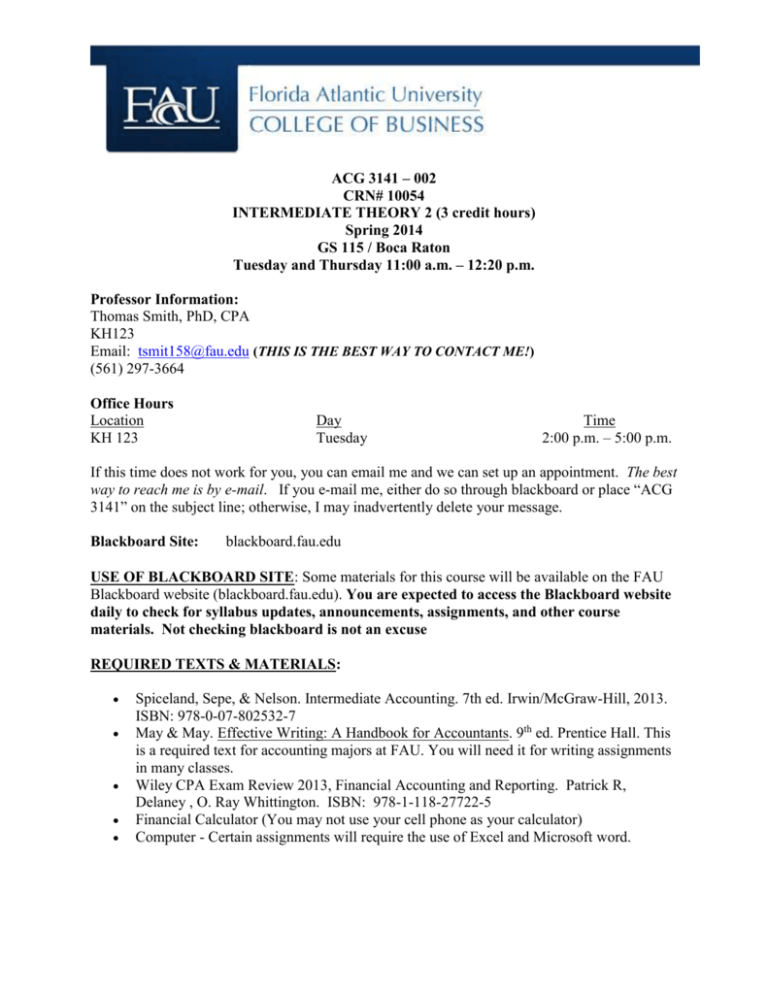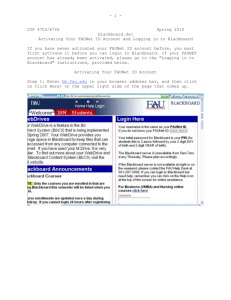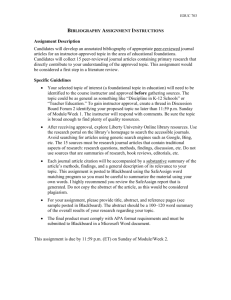ACG 3141
advertisement

ACG 3141 – 002 CRN# 10054 INTERMEDIATE THEORY 2 (3 credit hours) Spring 2014 GS 115 / Boca Raton Tuesday and Thursday 11:00 a.m. – 12:20 p.m. Professor Information: Thomas Smith, PhD, CPA KH123 Email: tsmit158@fau.edu (THIS IS THE BEST WAY TO CONTACT ME!) (561) 297-3664 Office Hours Location KH 123 Day Tuesday Time 2:00 p.m. – 5:00 p.m. If this time does not work for you, you can email me and we can set up an appointment. The best way to reach me is by e-mail. If you e-mail me, either do so through blackboard or place “ACG 3141” on the subject line; otherwise, I may inadvertently delete your message. Blackboard Site: blackboard.fau.edu USE OF BLACKBOARD SITE: Some materials for this course will be available on the FAU Blackboard website (blackboard.fau.edu). You are expected to access the Blackboard website daily to check for syllabus updates, announcements, assignments, and other course materials. Not checking blackboard is not an excuse REQUIRED TEXTS & MATERIALS: Spiceland, Sepe, & Nelson. Intermediate Accounting. 7th ed. Irwin/McGraw-Hill, 2013. ISBN: 978-0-07-802532-7 May & May. Effective Writing: A Handbook for Accountants. 9th ed. Prentice Hall. This is a required text for accounting majors at FAU. You will need it for writing assignments in many classes. Wiley CPA Exam Review 2013, Financial Accounting and Reporting. Patrick R, Delaney , O. Ray Whittington. ISBN: 978-1-118-27722-5 Financial Calculator (You may not use your cell phone as your calculator) Computer - Certain assignments will require the use of Excel and Microsoft word. Course Prerequisites and Credit Hours and Class Time Commitments Intermediate Theory 2 (ACG 3141) 3 credits Prerequisite: ACG 3131 Prerequisite or Co-requisite ENC 3213 or GEB 3213. A continuation of ACG3131. An in-depth study of accounting transactions, their effect on financial statements, and the impact that management decisions have on financial statements. Students lacking proper prerequisites may be administratively withdrawn from this or any other accounting course at any time during the term without receiving a tuition refund. According to Florida State Statute 6A-10.033, students must spend a minimum 2,250 minutes of in class time during a 3-credit course. Additionally, students enrolled in a 3-credit course are expected to spend a minimum of 4,500 minutes of out-of-class-time specifically working on course-related activities (i.e., reading assigned pieces, completing homework, preparing for exams and other assessments, reviewing class notes, etc.) and fulfilling any other class activities or duties as required. COURSE OBJECTIVES: This course is a continuation of ACG 3131. You will learn applied professional research skills, while continuing to develop oral and written communication skills. You will hone these skills through the study of a variety of revenue recognition and expense versus capitalization topics. You will also develop an understanding of the accounting cycle and debits and credits. You should review http://www.aicpa.org for a discussion of relevant competencies expected of accounting graduates. This course is designed to help you gain many of these competencies. The learning outcomes for this course are the following: 1-Analyze accounting transactions to determine their effect on the statement of cash flows, if any, and properly categorize the transactions as operating, investing, financing or non-cash investing and financing activities when preparing the statement of cash flow. The focus will be on the direct method of reporting cash flows, with a basic review of the indirect method. 2-Obtain an understanding of long-term debt with the focus on bonds. Calculate the selling price of bonds and prepare amortization schedules. Obtain knowledge of the financial statement presentation and disclosures for bonds. Analyze how to accrue interest when financial statements are prepared between interest dates. 3-Determine how to account for debt when it is retired early. Also determine how to account for debt that can be converted into stock or contains an option to purchase stock. 4- Analyze investment transactions (e.g. significant influence) to determine their effect on financial statements, if any, and properly categorize the investments as held-to-maturity, available-for-sale, or trading securities. Understand the fair value and equity methods of reporting for investments. 5-Understand how to record leases based on both the lessee and lessor’s perspective. Calculate present value of minimum lease payments taking into consideration concepts such as bargain purchase options, guaranteed residual value, etc. 6-Obtain an understanding of shareholder’s equity, how to record transactions, and how to properly present and disclose information pertaining to shareholder’s equity. 7-Assess what items may be classified as cash and cash equivalents while taking into consideration restricted cash and compensating balances. 8-Define and understand the essential characteristics of liabilities, valuation, and their proper classification (current vs. non-current). Obtain an understanding of the different types of liabilities such as: accounts payable, accrued liabilities, notes payable, liabilities from advance collections, gift cards, etc. Also, learn how to account for gain/loss contingencies (e.g., premiums, warranties, etc.) while taking into account subsequent event information when necessary. 9-Demonstrate an ability to calculate earnings per share (EPS) and understand the impact of equity transactions on EPS . 10-Understand how to value and present deferred tax asset/liabilities, including contingent tax asset/liabilities. 11-Be able to analyze, record, and present the effect of accounting changes, estimates, and error corrections. Course Evaluation Method: Tentative Grading Policy Excel Project Writing Assignment Exam 1 Exam 2 Final exam Total points 25 50 100 100 125 400 Semester grades are based on the results of the Writing Assignment, the Excel Project, and 3 Examinations. The first two examinations will be unit exams worth 100 possible points each and the third (final) examination will be comprehensive and worth 125 points. The final exam can replace the lower of the first two exam grades (if higher than any of them). The Writing Assignment will be explained in class and will be due on by midnight on 2/18/2014. The Excel Project will be explained in class and will be due on by midnight on 4/17/2014. Testing Procedures During examinations there will be no electronic devices permitted, other than a calculator. Students are not permitted to use their cell phones for any reason during an examination. If I see anyone using their cell phone during an exam I will assume that the student is using the cell phone to achieve an unfair advantage over other students and that student shall receive a zero for the exam. I also reserve the right to ask students to move during an exam. This is for the benefit of the rest of the class, and does not mean that I am accusing the person I am moving of cheating. Grading Scale A = 368 A- = 360 B+ = 348 B = 332 B- = 320 C+ = 308 C = C- = D+ = D = D- = F = 292 280 268 252 240 below 240 Additional Course Policies Missing Exams Make-up exams are not generally permitted after the test date, except in the case of a documented emergency. If you have advanced knowledge of an exam that you will miss, I must be notified prior to the exam date that you will not be in attendance with a legitimate excuse. If notified and approved, a make-up can be scheduled prior to the scheduled exam date. In the event of an unforeseeable circumstance, I reserve the right to offer a make-up exam after the scheduled exam date, provided the reason for the absence is documented and approved by me. Late Assignments Late assignments will not be eligible to receive full credit. If an assignment is turned in late a 20% deduction will be applied if the student is able to turn in the assignment within one week of the scheduled due date. After that time, an additional 30% reduction will be applied (total of 50% reduction for assignments turned in more than 1 week late). Attendance Policy Students are strongly encouraged to attend class. In order to be successful in this class it is imperative that you acquire the information presented in class lectures. Cell Phones. Cell phones should be turned off and put away during class. Texting during class is not permitted. Identification. Identification during exams is required. Professional Conduct. To foster a more professional learning environment, and to develop habits that lead to success in the business work, all participants must engage in professional behavior, including: 1. Taking responsibility for individual actions. 2. Being attentive and an active participant in group activities and class discussions. 3. Cell phones should be turned off and put away during class. Texting during class is not permitted. 4. Respecting diversity in the classroom and treating everyone involved in the class in a civil manner. 5. Planning outside activities to avoid conflicts with the activities outlined in the syllabus. 6. Meeting all deadlines in the course for assignments, projects, etc. 7. Acknowledging the importance of clarity of expression in written and oral communication. Safe Assign. Written components of any assignment or project may be submitted to Safe Assign to evaluate the originality of the work. Any students found to be submitting work that is not their own will be deemed in violation of the University’s honor code discussed below. Points Awarded. It is the responsibility of the student to monitor the points awarded. During the semester, the student has up to two weeks following the posting of any points to contest the number of points, after which the points are considered final. Electronic Communication. Blackboard and FAU email will be used in this course for content delivery, homework, and other communications. Accordingly, it is the student’s responsibility to check the Blackboard course site and FAU email account for announcements, etc. Students are responsible for ensuring that the correct email address is used for Blackboard. Religious Holidays. It is the responsibility of the student to promptly notify the professor of any conflicts due to religious observance so that accommodations can be arranged. Pictures. Photographs of each student may be taken / used in connection with the course. Hurricanes. In the event of a hurricane warning or watch, the class will meet in accordance with the university policy. Classes cannot be individually cancelled by the instructor, although assignments and exams may be modified or postponed in the event of a hurricane. Students should monitor Blackboard announcements regarding any weather-related course issues. Tentative Schedule Date Pre-class reading Lecture 7-Jan-14 Chapter 18 Begin Chapter 18 Ch.18:BE18-2,5,7,8,10,11,12,13,14; E182,3,4,5,6,7,8,11,13,14,15,18,19,20; P18-8,9,10,11 9-Jan-14 Chapter 18 Complete Chapter 18 CPA Prep:M15 (p.542-552) 1,2,3,4,5,6,7,12,13,15,17,19,20,23,24,25,36,37,38 14-Jan-14 Chapter 19 (EPS only) Begin Chapter 19 Ch. 19: BE19-10,11,12,13: E19-10,11,19; P19-13,15,16 16-Jan-14 Chapter 19 (EPS only) Chapter 19 21-Jan-14 Chapter 19 (EPS only) Complete Chapter 19 23-Jan-14 Chapter 21 Begin Chapter 21 28-Jan-14 Chapter 21 Complete Chapter 21 Ch. 19: BE19-10,11,12,13: E19-10,11,19; P19-13,15,16 CPA Prep: M15 (pp.547-549) 55,56,57,58,59,60,62,63,64,65,66,67,69,70 Ch 21:BE21-1,2,3,4,7,9,10; E21-1,2,4,14,27; P211,2,3,4,5,6,8,11,16,17 CPA Prep:M17 (p.631-635) 1,2,3,4,5,6,7,8,9,10,14,15,17,18,19,20,21,26,27 30-Jan-14 Chapter 7 Begin Chapter 7 Ch.7:BE7-6,8,9,10,11,12; E7-10,11,12,13,14,15,16,21; P7-1,4,6 4-Feb-14 Chapter 7 Complete Chapter 7 CPA Prep:M12 (p.314-315) 13,14,15,16,17,18,19,20,21,22,23 M13 (p360-361) 6,7,8,9,10,11,12 6-Feb-14 Exam 1 Review Exam 1 Review 11-Feb-14 Exam 1 Review Exam 1 Review 13-Feb-14 Exam 1 18-Feb-14 Exam 1 Chapters 18, 19, 21, and 7 Writing Assignment Due, Chapter 12 20-Feb-14 Chapter 12 Chapter 12 25-Feb-14 Chapter 12 Complete Chapter 12 CPA Prep:M16 (p.591-596) 7,8,9,10,11,12,15,16,18,36,38,39,40,41,42 27-Feb-14 Chapter 14 Begin Chapter 14 Ch.14:BE14-1,3,4,11,12; E14-2,3,4,5,6,9,11,18,27,28; P14-3,4,5 4-March-14 No Class – Spring Break 6-March-14 Begin Chapter 12 Homework Ch. 12:BE12-2,3,4,7,8,9,11; E12-2,3,4,5,7,9,12,13,14,16,17,18; P127,9 11-March-14 Chapter 14 Complete Chapter 14 CPA Prep:M13 (p.379-388) 4,5,6,7,8,10,12,13,14,16,17,31,36,40,41 13-March-14 Chapter 13 Begin Chapter 13 Ch.13:BE13-7,9,12,14,15,16,17; E13-11,15,16,21,22; P13-6,9,10 18-March-14 Chapter 13 Complete Chapter 13 CPA Prep:M12 (p.321-324)77,78,79,80,83,85,86,87,8895,96,97,98 20-March-14 Chapter 16 Begin Chapter 16 25-March-14 Chapter 16 Complete Chapter 16 Ch. 16: BE16-2,3,4,9,10,13,14; E16-2,4,13,15,22,28 CPA Prep: M14 (pp.499-504) 2,3,4,5,6, 8,9,12,13,14,15,17,19,21,22,30,33 27-March-14 Exam 2 Review Exam 2 Review 1-April-14 Exam 2 Review Exam 2 Review 3-April-14 Exam 2 Chapters 12, 13, 14 and 16 Exam 2 8-April-14 Chapter 15 Begin Chapter 15 10-April-14 Chapter 15 Complete Chapter 15 15-April-14 Final Exam Review 17-April-14 Final Exam Review Final Exam Review, Excel Project Due 22-April-14 Final Exam Review Final Exam Review 29-April-14 Final Exam - CUMULATIVE Final Exam Ch.15:BE15-1,3,4,8; E15-1,2,3,4,5,6,7,8,9,10,11,12,14,15,16,17,18,19; P15-5,6,7 CPA Prep:M13 (p.460-466) 1,2,3,4,5,7,19,20,21,22,23,24,25,26,27,28,33,36,37,42,43 Final Exam Review 10:30 a.m. - 1:00 p.m. Selected University and College Policies Additional course policies as desired (Optional) – Note: additional course policies should not conflict with established University and/or College and/or School Policies. Examples include the following: School of Accounting Policies You are responsible for School of Accounting policies at http://business.fau.edu/departments/accounting/school-of-accounting-policies/index.aspx. These policies are considered to be an integral part of this syllabus. Code of Academic Integrity Policy Statement Students at Florida Atlantic University are expected to maintain the highest ethical standards. Academic dishonesty is considered a serious breach of these ethical standards, because it interferes with the university mission to provide a high quality education in which no student enjoys an unfair advantage over any other. Academic dishonesty is also destructive of the university community, which is grounded in a system of mutual trust and places high value on personal integrity and individual responsibility. Harsh penalties are associated with academic dishonesty. For more information, see University Regulation 4.001. Disability Policy Statement In compliance with the Americans with Disabilities Act Amendments Act (ADAAA), students who require reasonable accommodations due to a disability to properly execute coursework must register with the Office for Students with Disabilities (OSD)—in Boca Raton, SU 133 (561-2973880); in Davie, LA 203 (954-236-1222); or in Jupiter, SR 139 (561-799-8698) —and follow all OSD procedures. Religious Accommodation Policy Statement In accordance with rules of the Florida Board of Education and Florida law, students have the right to reasonable accommodations from the University in order to observe religious practices and beliefs with regard to admissions, registration, class attendance and the scheduling of examinations and work assignments. For further information, please see Academic Policies and Regulations. University Approved Absence Policy Statement In accordance with rules of the Florida Atlantic University, students have the right to reasonable accommodations to participate in University approved activities, including athletic or scholastics teams, musical and theatrical performances and debate activities. It is the student’s responsibility to notify the course instructor at least one week prior to missing any course assignment. College of Business Minimum Grade Policy Statement The minimum grade for College of Business requirements is a “C”. This includes all courses that are a part of the pre-business foundation, business core, and major program. In addition, courses that are used to satisfy the university’s Writing Across the Curriculum and Gordon Rule math requirements also have a minimum grade requirement of a “C”. Course syllabi give individualized information about grading as it pertains to the individual classes. Incomplete Grade Policy Statement A student who is passing a course, but has not completed all work due to exceptional circumstances, may, with consent of the instructor, temporarily receive a grade of incomplete (“I”). The assignment of the “I” grade is at the discretion of the instructor, but is allowed only if the student is passing the course. The specific time required to make up an incomplete grade is at the discretion of the instructor. However, the College of Business policy on the resolution of incomplete grades requires that all work required to satisfy an incomplete (“I”) grade must be completed within a period of time not exceeding one calendar year from the assignment of the incomplete grade. After one calendar year, the incomplete grade automatically becomes a failing (“F”) grade. Withdrawals Any student who decides to drop is responsible for completing the proper paper work required to withdraw from the course. Grade Appeal Process A student may request a review of the final course grade when s/he believes that one of the following conditions apply: There was a computational or recording error in the grading. Non-academic criteria were applied in the grading process. There was a gross violation of the instructor’s own grading system. The procedures for a grade appeal may be found in Chapter 4 of the University Regulations. Disruptive Behavior Policy Statement Disruptive behavior is defined in the FAU Student Code of Conduct as “... activities which interfere with the educational mission within classroom.” Students who behave in the classroom such that the educational experiences of other students and/or the instructor’s course objectives are disrupted are subject to disciplinary action. Such behavior impedes students’ ability to learn or an instructor’s ability to teach. Disruptive behavior may include, but is not limited to: nonapproved use of electronic devices (including cellular telephones); cursing or shouting at others in such a way as to be disruptive; or, other violations of an instructor’s expectations for classroom conduct. Faculty Rights and Responsibilities Florida Atlantic University respects the right of instructors to teach and students to learn. Maintenance of these rights requires classroom conditions which do not impede their exercise. To ensure these rights, faculty members have the prerogative: To establish and implement academic standards To establish and enforce reasonable behavior standards in each class To refer disciplinary action to those students whose behavior may be judged to be disruptive under the Student Code of Conduct.



